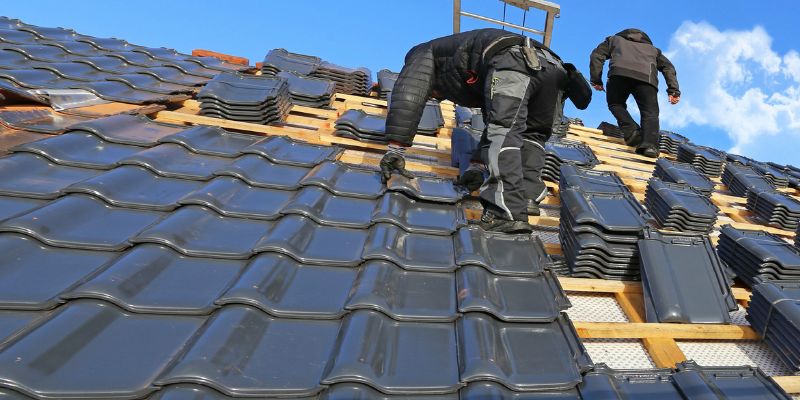After a severe storm, homeowners often face the daunting task of assessing the damage to their property, particularly their roofing system. While some damage may be minor and require only repairs, others may be more severe, raising the question: Is roofing replacement necessary after storm damage? In this comprehensive guide, we’ll explore the factors to consider when evaluating storm damage to your roof, discuss the benefits of timely repairs versus replacement, and provide valuable insights to help you make an informed decision. Whether you’re dealing with a few missing shingles or extensive structural damage, this guide will equip you with the knowledge and resources to address storm damage effectively and restore the integrity of your roofing system. Consulting with experienced Roofing Oakville professionals can also provide expert guidance on the extent of the damage and the most appropriate course of action.
Assess the Extent of Damage
The first step in determining whether roofing replacement is necessary after storm damage is to assess the extent of the damage. Conduct a thorough inspection of your roof, looking for signs of missing or damaged shingles, cracked or broken tiles, dented or punctured metal panels, and leaks or water infiltration in the attic or interior spaces. If the damage is limited to a few isolated areas and the underlying structure is sound, repairs may be sufficient to restore your roof’s integrity.
Consider the Age and Condition of Your Roof
Another factor to consider when evaluating storm damage is the age and condition of your roof. If your roof is relatively new and in good condition, with minimal wear and tear, repairs may be sufficient to address storm damage and prolong its lifespan. However, if your roof is nearing the end of its life expectancy or has existing issues such as widespread deterioration or structural weaknesses, replacement may be a more practical and cost-effective solution in the long run.
Evaluate the Cost of Repairs vs. Replacement
When weighing the decision to repair or replace your roof after storm damage, it’s essential to consider the cost implications of each option. While repairs may be less expensive upfront, they may only provide a temporary fix and could end up costing you more in the long run if the underlying damage worsens over time.
On the other hand, investing in a full Roofing Mississauga replacement may offer greater peace of mind and long-term durability, potentially saving you money on future repairs and maintenance.
Consider Insurance Coverage and Deductibles
If your home insurance policy covers storm damage, it’s essential to review your coverage and deductible before deciding on roofing replacement. Depending on the extent of the damage and your policy terms, your insurance provider may cover some or all of the costs associated with repairs or replacement. Be sure to document the damage thoroughly, including photographs and written estimates from reputable roofing contractors, and work closely with your insurance adjuster to expedite the claims process and maximize your coverage. Consulting with a trusted Mississauga Roofers can also provide valuable assistance in navigating the insurance claims process and ensuring that all necessary repairs are properly addressed.
Seek Professional Advice and Estimates
When in doubt, seek professional advice from experienced roofers or a reputable roofing company. A qualified roofing contractor can assess the extent of the damage, provide an accurate diagnosis, and recommend the most appropriate course of action based on your needs and budget. They can also provide detailed estimates for repairs and replacement, including labor, materials, and any additional services required to restore your roof to its pre-storm condition.
Act Promptly to Prevent Further Damage
Regardless of whether you opt for repairs or replacement, it’s essential to act promptly to address storm damage and prevent further deterioration. Even minor damage can worsen over time, leading to leaks, mold growth, and structural issues if left unattended. By addressing storm damage promptly and proactively, you can minimize the risk of costly repairs and ensure the long-term integrity and performance of your roofing system.
Conclusion
In conclusion, the decision to replace or repair your roof after storm damage depends on various factors, including the extent of the damage, the age and condition of your roof, the cost of repairs versus replacement, insurance coverage, and professional recommendations. By conducting a thorough assessment of the damage, weighing the pros and cons of each option, and seeking guidance from experienced roofers, you can make an informed decision that meets your needs and restores the integrity of your roofing system. Whether you opt for repairs or replacement, acting promptly to address storm damage is essential for protecting your home and ensuring its longevity and value for years to come.
You may also like
-
The Most Popular Metal Roofing Styles and Colors in 2025
-
How Commercial Roofing Contractors Can Help Improve Building Energy Efficiency
-
Maintaining the Integrity of Your Roof: Why Timely Repairs Matter
-
Expert Local Roofers: Quality Roofing Solutions for Your Home
-
Residential Siding Installation Tips for Lynbrook Homes

